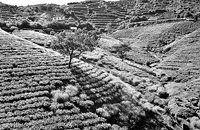| Interest up for first time this year as money supply rises The Central Bank last week raised interest rates
– for the first time this year – on its Repurchase (Repo)
and the Reverse Repurchase (Reverse Repo) rates saying reserve money
and broad money supply has increased in the economy. In a statement the Bank said it has been adopting tighter monetary policy measures to contain the excessive growth in the money supply. “Despite this, reserve money grew by around 18 per cent in May 2006, which is above the targeted path. Broad money too has been rising at around 20 per cent, largely due to the expansion in private sector credit. This situation calls for the adoption of appropriate policy measures from both monetary and fiscal fronts to contain inflationary pressures.
Further, in view of the continuing high oil prices on which Sri Lanka has no control, there is an urgent need to respond effectively to these new developments. Therefore, it is necessary that all Sri Lankans respond positively by promoting the efficient use of energy as well as by promoting alternative non-fuel based energy sources, taking a longer-term view,” it said justifying the decision to increase interest rates. The Bank said economic activity in 2006 has been broad-based, reflecting the expansion in all the key sectors of the economy. According to the estimates made by the Department of Census and Statistics, the economy grew by 7 per cent during the first quarter of 2006, a continuation of the high growth momentum seen in the previous three quarters. Paddy production during the 2005/06 Maha season reached another record level. Tea and rubber production increased further during the first four months, while coconut and fish production also reflected similar trends. There has been an expansion in the output of subsidiary food crop sector as well. The textile, apparel and leather products sub-sector has also expanded further so far during the year. Hydro power generation increased, making a significant positive contribution to overall economic growth. Meanwhile, the growth momentum in construction activity continued and this was made evident by the growing demand for building materials. In the services sector, port services, telecommunications and tourism sub-sectors continued to perform well, while the value addition of financial services also showed an improvement. The growth momentum in investment would continue to provide further impetus to future growth. The Bank said in the external sector, export earnings grew by 4 per cent, while expenditure on imports grew at a relatively higher rate of 17.5 per cent during the first four months. The growth in imports was mainly reflected in a continued expansion in the intermediate and investment goods imports. The resultant large trade deficit has been financed to a large extent through increased private remittances. These together with the higher official capital inflows led to an overall surplus in the balance of payment. The gross official reserves stood at US dollars 2.6 billion by end May 2006, which is sufficient to cover 3.4 months of imports while the total external reserves of the country amounted to US dollars 4.5 billion, covering 5.8 months of imports by end April 2006. Continued expansion in economic activity, higher domestic demand and cost-push factors associated with the adjustments in the fuel prices led to an increase in the consumer prices in April and May 2006. “In this context, the government’s
recent decision to allow an upward adjustment of the prices of petroleum
products based on commercial considerations by the Lanka Indian
Oil Corporation (LIOC) would also help reduce the burden on the
budget which would enable the government to reallocate its scarce
resources to productive expenditure to generate the desired growth.
In addition, the recent upward adjustment in the tariffs on wheat
flour and wheat grain would also help make favourable economic adjustments,”
the statement said. |
||||
Copyright © 2006 Wijeya Newspapers
Ltd. All rights reserved. |
